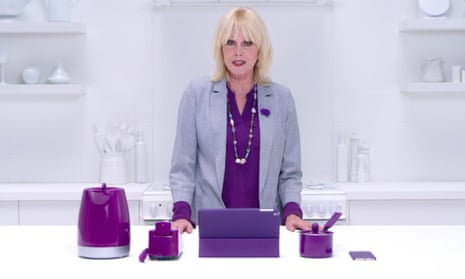It’s a money-making opportunity being promoted by Joanna Lumley where, for just a few hours’ work a week, “you will quickly find yourself earning an extra few hundred pounds each month”. With a bit more effort, she says, “you could earn thousands of pounds each month”.
Sure enough, the accompanying literature holds out the tantalising prospect of a potential income of £2,340 a month – about £28,000 a year – which is more than the average UK salary.
But when Guardian Money investigated, we found that the average amount being earned appears to be less than £10 a week, which is a far cry from the “life-changing” income talked about in the publicity material.
Our number-crunching suggests that even if “thousands” a month just means £2,000 (or £24,000 a year), only a maximum of 879 people could have earned that amount in the 12 months to April this year. And even for that to work, all the other 40,000-plus people signed up would have to have earned nothing at all.
So who is behind this scheme, and is it a scam? And what has Lumley, this year’s Bafta fellowship recipient and all-round national treasure, got to do with it?
The Absolutely Fabulous star is the new face of Utility Warehouse, an energy and communications company that some people will not have heard of, but which is a major player with more than 600,000 customers. It is unusual in that it doesn’t advertise, isn’t keen on price comparison websites and doesn’t seek national press coverage. Instead, its services are promoted by an army of independent “partners” or agents who earn commission by encouraging their friends and family to sign up for its gas, electricity, landline, mobile and broadband services. In some ways it’s the Avon or Tupperware of the energy industry, but critics point out that the agents even have to pay £100-£200 to become a salesperson, and that the buyers of its energy deals are paying over the odds.
Utility Warehouse says it is important to understand that “we are presenting illustrations of what is achievable by potential new partners, as opposed to any form of guaranteed income”, and that there is “huge variation” in levels of activity and therefore earnings. It adds that it is confident it is “not taking advantage of” its partners.
The Utility Warehouse brand is owned by Telecom Plus, a FTSE 250 company. In May it was named “telecom services provider of the year” by consumer group Which?.
The partner payments scheme is legal, though trying to get your head around its byzantine system of commissions and fees, plus the jargon – there’s something called the “stairway to success” with eight different levels of partner – takes some doing.
There are more than 40,000 partners, mainly ordinary people looking to make some cash. To become a partner you pay a joining fee of £100, or £199.75 if you are not a customer. You earn money from the customers you sign up, plus you can recruit other partners. And when they sign people up, you earn a small share of the money they spend too. The company says there are “customer gathering bonuses” averaging £20 for each person you sign up, plus “fast start bonuses” for new partners worth up to £1,000, “residual income” (ongoing commission from the people you have signed up), “group residual income” (ongoing commission from the customers that those in your “team” sign up), and “QUIP” payments (a way of accelerating your residual income).
In one promotional video, Lumley – who is the latest celebrity to plug the company; others have included Dawn French and Jennifer Saunders, and Terry Wogan – says: “Spend a few hours a week building your business and you will quickly find yourself earning an extra few hundred pounds each month. Keep going, work a little harder and you could earn thousands of pounds extra each month … It could earn you financial freedom for life.”
Another video states that “thousands of partners … are already receiving a life-changing residual income every month”. And a document that partners can download from the website to explain the scheme to would-be recruits states you could earn £2,340 a month in group residual income. This assumes you will be receiving a 30p per person per month commission from 7,800 customers signed up by your team.
It’s not hard to find people who say they are pocketing decent sums. On YouTube we found a video of a former police officer, Jimmy Chapman, who says: “I earn more every two days than I used to earn in the police in a month.”
But do many people really earn such large amounts? There is little information in the company’s recently published annual results (for the year ending 31 March) about payments to partners, but it’s enough to do some calculations. The results disclose that there are 41,717 registered partners and that the average number of customers per partner is a little over 14.
Elsewhere in the document is a small section about “distribution expenses”, which include the share of the company’s revenue that it pays as commission to partners. This figure was £21.1m for the year. Dividing that pot between the 41,717 partners gives an average of £505 per person per year, which is £42 a month, or £9.73 a week. And that’s before their own operating costs, the joining fee and tax are taken into account. The partners are self-employed and responsible for paying their own tax.
And woe betide if any customers sign up and then cancel or default on their first bill – you will be stripped of the customer gathering bonus you received for them, as these are clawed back in such a scenario.

The partners do a lot of legwork, but their £21.1m represents less than 3% of the company’s total revenue for the year, which was £740m. The firm seems to be thriving financially: adjusted pre-tax profits leapt 9% to £53.3m.
However, it has also been suggested that many people who sign up for the company’s gas and electricity are paying more than they need to. Just a few months ago, Ofgem revealed that 94% of Utility Warehouse’s energy customers were sitting on standard variable tariffs, which the energy watchdog says are “usually more expensive than other deals”. That’s the highest percentage for any big utility firm. And only this week, Ofgem disclosed that Utility Warehouse’s dual-fuel standard tariff customers could typically save £148 a year by switching to the company’s cheapest deal.Mark Todd, who runs price comparison site Energyhelpline.com, says those on Utility Warehouse’s dual-fuel standard deal could typically save £277 a year by switching to the cheapest deal on the market.
‘Many people have transformed their lives’
A Utility Warehouse spokesman says that dividing the £21.1m between the 41,717 partners “is inevitably misleading: there are many who for whatever reason earn considerably less than £500 per year, and there are those who work at their business extremely hard and earn considerably more than this”.
He says the document that mentions an income of £2,340 a month uses “conservative” assumptions, adding: “Does this imply that all partners will achieve this level of income? Categorically not … [It] is a fair illustration of how the commission works and what could be achieved.”
The spokesman also says that in terms of costs, the company provides partners with all the tools they need so they “do not have to invest anything other than their joining fee and their time”. Most pay a £100 fee, which goes towards setting-up costs.
“There is huge diversity among our partners and there are many people who have changed their lives and transformed their financial prospects by taking advantage of the opportunity that Utility Warehouse provides.”
The company says that while around 3% of revenue shared between partners “may sound low, we operate in low-margin industries, and the company’s statutory profit margin itself is only around 5.5%”.
On its energy pricing, Utility Warehouse says it had a “conversation” with Ofgem after it published its findings. The spokesman says the company has adopted a fundamentally different approach to most other suppliers. It offers four tariffs to both new and existing customers that reflect the number of services taken, rather than being dependent on whether they are new or old, which “we believe is a much fairer approach”.

Comments (…)
Sign in or create your Guardian account to join the discussion